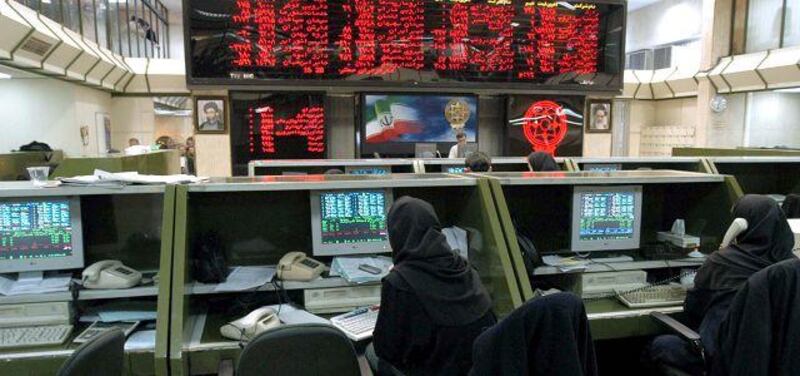TEHRAN // When most people think of the Iranian economy, they think of UN sanctions and the potential development of nuclear power. But a stock market boom? One is well under way. The main index for the Tehran Stock Exchange (TSE) last month reached its highest level in its 42-year history and last week exchange officials issued a statement to reassure investors they are not in the middle of a market bubble.
"Concerns about bubble growth are unfounded," Ali Sahraie, the operations manager of the TSE, said in a statement released by the bourse. "The reason for the rise in the index is the flow of cash into the stock market." Mr Sahraie said the sharp ascent was a reflection of the overall improvement of Iran's economy, and many outside observers agree. "Even though [the market] is rallying I still think of it as underperforming," said Ahmad Alanani, a trader with Exotix, a company based in London that specialises in frontier markets.
Mr Alanani said the TSE dropped more than 40 per cent last year, lagging well behind its peers in the UAE and elsewhere in the Middle East. That performance can be attributed, in part, to the lingering effects from a crash between August of 2008 and March last year when the index lost 40 per cent of its total value before reaching bottom at 7,096. It now trades at more than 14,000. That fall was mainly due to the drastic decline in international oil and mineral prices and an ailing domestic economy. But some analysts are concerned that a similar correction could be coming if the appropriate measures are not taken.
Looming on the horizon is the plan by the Iranian president Mahmoud Ahmadinejad to cut energy subsidies. Introducing the plan, which Mr Ahmadinejad refers to as "big surgery on Iran's economy", is expected to drastically raise the price of fuel and electricity within a few months. "The implementation of the plan, if carried out recklessly, can lead to a real drop in profitability of companies, and hence in the price of their securities, considering Iranian industries' high energy consumption levels and their unpreparedness to adapt to a sudden increase in energy prices," the market analyst Shervin Shahriyari wrote recently.
Others feel that while cutting the subsidies may be painful in the short term for Iranian consumers and companies, it will be a positive in the long run. The Iranian market is largely closed to foreign investment, so the recent sharp increase is almost entirely driven by internal sentiment. Analysts say Iranians are steered to the stock market by stagnation in other regional investments, including property markets, as well as reduced interest rates offered by banks for savings accounts. "The fact is there are a lot of people who have quite a bit of money and they are looking for a home for it," said Mehdi Varzi, of the UK consultancy Varzi Energy. The potential problem, Mr Varzi said, was that "it's not a very transparent market".
To meet the growing demand, Shamseddin Hosseini, the Iranian minister of finance and economy, promised recently to offer shares of more government-owned companies to the stock market. The government says it is also planning to attract foreign investors by easing regulations and offering incentives such as tax exemption. "The organisation has reduced the bureaucratic channels to a great extent. It also issues investment permits for foreign nationals in less than seven days," Ali Saleh Abadi, the head of Securities and Exchange Organisation of Iran, was recently quoted as saying by Iran's Press TV.
Many outsiders are dubious that Iran will be able to attract large-scale foreign investment in the near future. In a report on April 23, the Economist Intelligence Unit, part of the UK-based Economist Group, advised foreign companies to minimise dealings with the TSE and ensure that financing for local partners established through the market was secure. "The market remains opaque and poorly regulated," the report said.
But many small Iranian investors are delighted with the recent boom. They are busily buying and selling the stocks outsiders prefer to avoid. "I'm still buying small and selling small," said Saman Taghizadeh, one such investor. "I lost quite a bit in the stock exchange market in bubble days and in the real estate market. "I need to make sure the recent boom is real. I also need to be cautious as I can't really predict what is going to happen if there are fresh UN sanctions soon." @Email:business@thenational.ae






